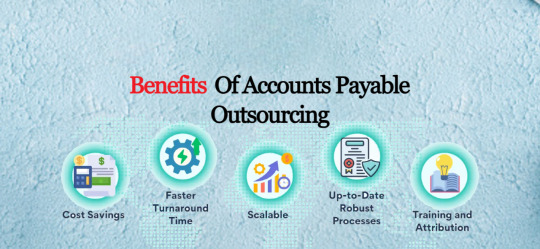Don't wanna be here? Send us removal request.
Text
In today's fast-paced finance world, manual invoice processing is no longer viable. Leading accounting teams are transforming their operations with NetSuite Accounts Payable Automation, combining it with outsourcing accounts payable services and offshore accounts payable management to achieve efficiency, accuracy, and visibility—all while reducing costs.
1. Powerful Features: What Makes NetSuite AP Automation Stand Out
OCR Invoice Capture & E-Invoicing NetSuite converts paper or emailed invoices into digital data, using OCR to extract critical fields like vendor names, amounts, and dates.
Three-Way Matching & Rules-Based Approval Invoices are automatically matched to purchase orders and receipts, with built-in tolerance rules ensuring accurate payment approvals—reducing manual intervention .
Automated Approval Routing & Dashboards Invoices are routed to the right approvers with automated reminders, while live dashboards offer visibility into processing stages and spending patterns.
AI & RPA Enhancements NetSuite can refine OCR accuracy, suggest GL codes, flag anomalies, and trigger reminders—all powered by intelligent automation.
2. Key Benefits: Why It’s a Game Changer
Massive Cost and Time Savings AP teams often spend hours on manual data entry and processing. NetSuite automation reduces per-invoice time dramatically, often by 80–90%.
Improved Accuracy and Fraud Prevention Automated matching and exception handling help eliminate duplicate payments and reduce fraud risk.
Real-Time Visibility and Control Live dashboards provide instant insights into overdue invoices, liabilities, and cash flow needs .
Better Vendor Relationships Faster processing ensures on-time payments, which strengthen vendor trust and open the door to early-payment discounts.
Compliance and Secure Audit Trails Every step is logged—approvals, payments, access—supporting internal controls and audits.
3. Why Outsourcing Still Matters
You might wonder: If NetSuite automates AP, do we still need outsourcing? The answer is yes:
Complex Invoice Exceptions: Offshore AP teams can manage exceptions, vendor outreach, and multi-currency payments that software alone can’t handle.
Scaling Support: During growth or peak volumes, outsourcing ensures continuity without hiring overhead.
Expert Oversight: Seasoned providers like KMK Ventures can optimize your rules, monitor KPIs, and offer ongoing support.
Combining NetSuite automation with offshore AP services creates a powerful, scalable model.
4. Best Practices: Smooth NetSuite AP Implementation
Integrating NetSuite AP with offshore or internal teams requires care. Follow these best practices:
Secure Stakeholder Buy‑In Educate your team about how automation and offshore AP support improve efficiency and accuracy.
Appoint a Project Lead Designate someone to oversee implementation, workflows, vendor onboarding, and training .
Phase in Features Carefully Begin with OCR capture and invoice routing before layering in matching, remote staff, and exception rules.
Communicate with Vendors If using a portal, inform suppliers how to submit invoices and check statuses .
Integrate with Procurement Systems Sync PO issuance, approvals, and stock or service delivery processes for full end-to-end flow.
Secure Access and Data Enforce role-based permissions, encryption, and audit logs—especially when using offshore teams .
Monitor Key Metrics Track processing time, cost per invoice, exception rates, and discount capture to optimize performance.
Provide Training & Support Help your team and offshore partners understand NetSuite workflows through ongoing education.
Continuously Improve Enable monthly reviews and quarterly audits of processes, exceptions, and vendor feedback.
5. FAQs
Q: Can NetSuite AP automation and offshore teams work together? Absolutely. NetSuite covers automation, while offshore teams manage exceptions and vendor outreach—creating an efficient, hybrid model.
Q: Can small or mid-size businesses benefit? Yes. NetSuite’s automation features are scalable, and combining with offshore services gives SMEs enterprise-level AP capabilities.
Q: How soon will we see ROI? Most organizations begin saving time and reducing errors within the first 3–6 months of launching automation and offshore support.
6. Real-World Success: KMK Ventures + NetSuite
When a growing SMB using NetSuite partnered with KMK Ventures for offshore AP support, they combined automation with expert management:
Invoice processing time decreased by 70%
Error rates dropped below 2%
Early payment discounts increased, saving thousands
Internal staff were freed for strategic tasks
The result? Reliable AP, improved cash flow, and stronger vendor relationships.
Final Word: Unlock the Full Potential of AP
NetSuite Accounts Payable Automation is powerful on its own—but when paired with outsourcing accounts payable services and offshore AP management, it becomes transformative.
You gain:
Faster invoice processing
Cost reductions
Higher data accuracy
Insightful dashboards
Scalability
A strategic finance function
If you're ready for smarter, more efficient AP processes, consider NetSuite automation with offshore support from KMK Ventures.
📞 Contact KMK Ventures to explore NetSuite-enabled AP solutions tailored to your growth goals.
0 notes
Text
Smarter Finance Starts Here: The Business Case for AP Outsourcing

Discover how accounts payable outsourcing can streamline your finance operations, cut costs, and boost accuracy. This strategic shift empowers CFOs and finance teams to focus on growth, not paperwork. Learn why forward-thinking businesses are upgrading their back office with smarter, scalable AP solutions built for today’s demands. Smarter finance starts here—efficient, compliant, and future-ready.
1 note
·
View note
Text
What is the role of accounts payable outsourcing in audit findings?Outsource Accounts Payable for Business Growth
Accounts payable outsourcing plays a crucial role in improving audit readiness and minimizing compliance risks. By ensuring accurate, timely documentation and standardized workflows, AP outsourcing helps businesses maintain clean, traceable records. This simplifies audit processes, reduces discrepancies, and supports stronger internal controls. For CFOs, it means fewer audit findings, improved transparency, and enhanced financial credibility. In today’s regulated environment, AP outsourcing is a smart strategy to strengthen financial governance and ensure smooth, stress-free audits.

0 notes
Text
The Business Case for AP Outsourcing: Cost, Compliance & Growth Benefits

Outsource Accounts Payable for Business Growth
As businesses scale, managing accounts payable in-house can become costly, error-prone, and inefficient. That’s why more CFOs are building a strong business case for AP outsourcing—to reduce costs, strengthen compliance, and support sustainable growth. By outsourcing AP, companies gain access to streamlined workflows, real-time reporting, and improved vendor management, all while freeing up internal resources for strategic initiatives.
0 notes
Text

Your Guide to Scalable and Stress-Free Accounting & Tax Solutions
Discover how scalable and stress-free accounting & tax solutions can streamline your financial operations and support business growth. This guide explores the benefits of outsourcing, from cost savings and compliance to real-time insights and expert support. Ideal for startups and growing businesses, learn how to simplify your finance function while focusing on strategic goals. Say goodbye to accounting headaches—embrace efficiency with outsourced expertise.
0 notes
Text
What Are Outsourced Tax Services and How Do They Work?
In the evolving landscape of modern business, financial management is more complex—and more critical—than ever. One area where companies increasingly seek efficiency and expertise is tax preparation and compliance. As a result, outsourced tax services have gained significant traction across industries, helping businesses reduce costs, stay compliant, and focus on their core operations. But what exactly are outsourced tax services? And how do they work in practice? This guide provides a clear, SEO-optimized breakdown of the concept, benefits, processes, and key considerations.
What Are Outsourced Tax Services?
Outsourced tax services refer to the practice of hiring external professionals or firms to manage all or part of a company’s tax-related responsibilities. These services can include tax preparation, planning, filing, compliance, audit support, and strategic consulting.
Instead of maintaining an in-house tax department, businesses can contract experts—such as CPAs, tax attorneys, or specialized tax advisory firms—to handle everything from individual returns to complex corporate filings.
Outsourced tax solutions are used by:
Small and medium-sized businesses
Startups and entrepreneurs
Large corporations
Freelancers and independent contractors
Key Services Offered by Outsourced Tax Firms
The scope of services can vary depending on the provider and the client’s needs, but typically includes:
1. Tax Preparation & Filing
Federal, state, and local tax returns (e.g., Form 1120, 1065, 1040)
Estimated tax calculations and quarterly filings
Filing extensions and amended returns
2. Tax Planning & Strategy
Year-round tax-saving strategies
Entity structure consultation
Deductions, credits, and exemptions
3. Sales & Use Tax Management
Multi-state sales tax compliance
Nexus analysis and registration
Automation setup and reconciliation
4. International & Cross-Border Tax Services
Foreign income reporting (e.g., FBAR, FATCA)
Transfer pricing
Withholding tax compliance
5. IRS & State Audit Representation
Correspondence and communication with tax authorities
Preparing documentation and audit defense
How Do Outsourced Tax Services Work?
The outsourced tax process typically follows a clear workflow, ensuring smooth coordination and accurate results. Here’s how it usually works:
Step 1: Initial Consultation
You meet with the provider to assess your tax needs. This includes business type, revenue, industry, current filing status, and pain points.
Step 2: Data Collection
The provider requests relevant financial documents:
Profit & Loss statements
Balance sheets
Payroll records
Prior tax returns
Expense documentation
Some firms use secure portals or cloud platforms to make this step seamless.
Step 3: Tax Strategy & Planning
The outsourced team evaluates opportunities for:
Deductions and credits
Entity optimization (LLC, S-Corp, C-Corp)
Tax deferral strategies They’ll also advise on changes that could reduce your liability.
Step 4: Tax Preparation & Filing
The tax team prepares your returns, reviews them for accuracy, and files them electronically. You’ll usually get a final review before submission.
Step 5: Ongoing Compliance & Support
Throughout the year, your provider may:
Send reminders for quarterly taxes
Update you on tax law changes
Help with notices from tax authorities
Provide access to real-time reports
Benefits of Outsourced Tax Services
More businesses are embracing outsourced tax support for several key reasons:
Cost Savings
Hiring in-house tax professionals involves high salaries, benefits, and software investments. Outsourcing cuts those costs and offers predictable pricing models—flat rates, per-filing, or monthly retainers.
Access to Expertise
Outsourced firms specialize in tax laws and keep up with complex changes. This reduces risk and ensures compliance, especially for businesses operating in multiple states or countries.
Time Efficiency
Business owners and CFOs save countless hours by letting tax professionals manage deadlines, forms, and calculations.
Scalability
As your business grows, your tax needs evolve. Outsourced firms can adapt easily without requiring internal hiring or retraining.
Audit Support & Risk Reduction
Most providers offer audit support and help mitigate risk by ensuring your returns are accurate and well-documented.
Who Should Use Outsourced Tax Services?
While any business can benefit, outsourcing is particularly ideal for:
Startups & small businesses that lack internal finance teams
Freelancers & solopreneurs juggling multiple income streams
Multi-state & eCommerce businesses with complex sales tax needs
International companies managing foreign reporting requirements
Growing enterprises seeking a scalable, expert-backed solution
Choosing the Right Tax Outsourcing Partner
To get the most out of outsourced tax services, you need the right partner. Here’s what to consider:
Reputation & experience in your industry
Certifications (CPA, EA, tax attorney, etc.)
Service scope (Do they handle planning and audit defense?)
Technology (Secure portals, cloud-based platforms)
Communication (Is support ongoing or seasonal?)
Pricing structure (Transparent and scalable to your needs)
Final Thoughts
In 2025, the tax environment is more complex than ever—and businesses can't afford to make costly mistakes. Outsourced tax services offer a modern, efficient, and expert-driven solution that helps companies stay compliant, reduce tax burdens, and free up valuable time. Whether you're a solo entrepreneur or managing a growing enterprise, partnering with a trusted outsourced tax provider could be one of the smartest financial decisions you make this year.
0 notes